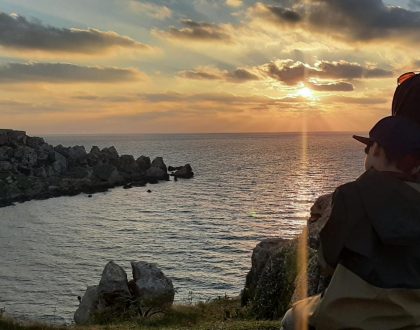Fear in Islam: Deeds Alone are Not Sufficient to Earn Entry to Jannah (part 1)

by Abu Shama
Not Relying on Your Deeds as Your Ticket to Paradise
There are 9 legitimate types of fear which Imam Muhasibi, the influential scholar from Basra renowned for his introspection, explored in his work on fear and hope. The first fear is fearing how our good deeds will counted and how we viewed them.
Fearing deeds may not be accepted
Relying on our deeds is to implicitly say, ‘my deeds is my admission ticket to enter Paradise’ – and this is not so. No one can compel Allah Almighty to admit them to Paradise on the account of their good deeds.
The Messenger of Allah Almighty (peace be on him) said about a man from the previous nations:
“Allah Almighty Almighty says: “Enter my servant into Paradise with my mercy.” He says: no by my works. He says: “Enter my servant into Paradise with my mercy.” He says: no by my works. Allah Almighty Almighty says: “Enter my servant into Paradise with my mercy.” He says: no by my works. And Allah Almighty says to the angels: “My servant is judged by my favour and his works.” And the favour of his sight [is placed on one scale] and weighed [against] his worship of five hundred years. The favour of the eye remains on it [outweighs his works]. Allah Almighty says: “Put my servant in the fire.” He said: My Lord with your mercy enter me into Paradise. [Al-Hakim and Al-Bayhaqi]
We should not become overly confident upon the good deeds we have done. We have no guarantee they will be accepted. Acceptance is not in our hands but in Allah Almighty’s Hands. Besides, what assurance do we have that Allah Almighty has accepted our works? We need to be humble for arrogance and sense of entitlement is a sure-fire way of spoiling our deeds.
In other words, ‘O Allah Almighty do not leave me to myself for a moment let alone my ‘good’ deeds’. We need the support of Allah Almighty and His facilitation in everything we do.
We fear Allah, we supplicate to Allah Almighty and beg Him to forgive and show mercy in order to relieve us from relying on our good deeds. If we were to rely on our deeds, we may be deluded by them.
The Messenger of Allah (peace be on him) used to supplicate to Allah Almighty.
اللَّهُمَّ رَحْمَتَكَ أَرْجُو فَلا تَكِلْنِي إِلَى نَفْسِي طَرْفَةَ عَيْنٍ وَأَصْلِحْ لِي شَأْنِي كُلَّهُ لا إِلَهَ إِلاَّ أَنْتَ
“O Allah, it is Your mercy that I hope for, so do not leave me in charge of my affairs even for a blink of an eye and rectify for me all of my affairs. None has the right to be worshipped except You.” [Abu Dawud]
A question may be posed here, ‘If good deeds do not lead us to be admitted in to Paradise, then why do them?’
There are two things here. (1) Performing good deeds and (2) relying on them. Performing good deeds is one thing (and we have to do good deeds – those who believe and do righteous deed is what the Qur’an says time and again) and relying on them is something different altogether.
Reassuringly, Allah Almighty is Ash-Shakur (Most Appreciative) and Al-Adl (All-Just), so He will not let any good deed go to waste. The Messenger of Allah Almighty (peace be on him) said:
“The good deeds of any person will not make him enter Paradise.” They (the companions) said, ‘Not even you, O Messenger of Allah Almighty?’ He said, “Not even myself, unless Allah Almighty bestows His favour and mercy on me.” So be moderate in your religious deeds and do the deeds that are within your ability.” [Bukhari]
The Messenger of Allah Almighty (peace be on him) said: “Allah Almighty is Pure and He accepts only that which is pure.” [Muslim]
Imperfections of Deeds
Acceptance of deeds in Allah Almighty’s court occurs when the deeds are free of blemishes whether in its inner reality or outward performance. The danger of relying upon our deeds are that we have no assurance that they were done purely for Allah’s sake. If our deeds are tainted with the slightest impurity or has shortcomings or has corruption of motive or done insincerely or has riya or done without proper due care and attention [which are always prevalent in everything we do], they run the risk of not being accepted unless He overlooks all the blemishes – both hidden and apparent, and turns to us with mercy.
Increasing Good Deeds
This is why we strengthen our fardh salah with nawafil salah in order to make up for shortcomings in the fardh, we thereafter strength the nawafil salah with adkhar and istaghfar to redress the shortcomings in them and so on… If we are fortunate, Allah Almighty will let us see the shortcoming and defects in our practices, and this is from His mercy – to be informed is to be in a position to rectify them.
On the other side, perhaps, a deed we consider to be insignificant may not be small before Allah Almighty because of the sincerity that is to be found within. Ata’illah said in his Hikam.
“No deed arising from a renouncing heart is small, and no deed arising from an avaricious heart is fruitful.” [Hikam 45]
The story of the woman of the previous nation who gave water to a thirsty dog encapsulates this Hikam. The woman – who was a prostitute – was forgiven on the account of her good deed. She showed mercy upon another creation of Allah Almighty and the All-Merciful showed mercy to her. She may have considered the feeding the dog as something small, but it emanated from a pure heart and Allah Almighty multiplied the good deed immensely. Similarly actions that are apparently big may in fact be small or even null before Allah Almighty because of the impurities that lie within.
Not being Self-Satisfied
Sometimes obedience makes us become proud and conceited, whereas sins leads to humility and brokenness. Thus,
“A disobedience that lend itself to humiliation and extreme need is better than an obedience that lend itself to self-infatuation and pride.” [Hikam 96]
Going back to fear and hope, fear deter us from doing sins because we regard the station of our Lord. Hope is lifting us when we fall down, that we can start again and rectify what has been missed. And love is creating the longing service that draws us closer to Him.
Having Sincerity
We should not abandon performing righteous deeds because of the existence of defects, for deeds performed is better than abandoning them completely, and is not through practice that sincerity is achieved?
Good deeds are necessary but they’re not enough. Perform deeds sincerely and properly and for thereafter have hope in the mercy of Allah, for the mercy of Allah Almighty is near to good-doers.
“Call on Him with fear and longing, indeed the mercy of Allah Almighty is near to those who do good.” [Al-Araf: 7:56]
Based on a talk by Shaykh Haytham Tamim in December 2018 on the Adab an Nufus by al Harith ibn Asad al Muhasibi (781-857)
Recommended Posts

Can playing with children be an act of worship?
February 21, 2023

Ghazali on Reliance (part 2)
October 27, 2022

Ghazali on Reliance
October 14, 2022

